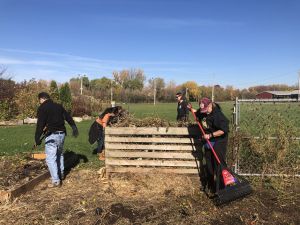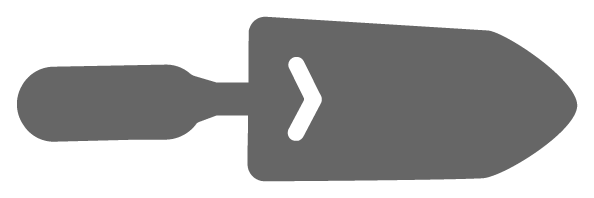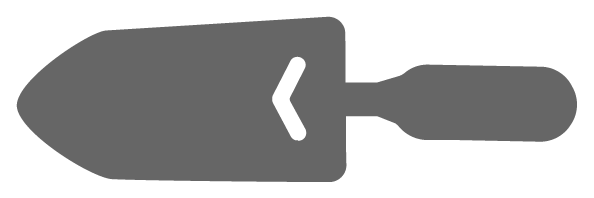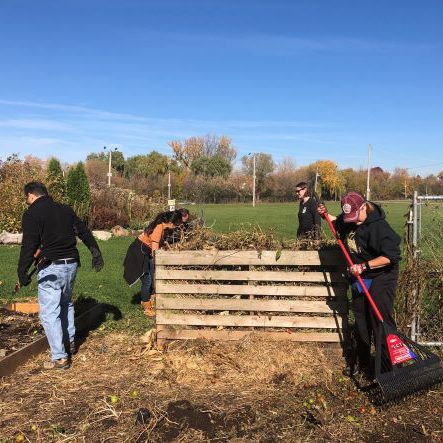I’ve been known to pilfer bags of chopped leaves from the curb around the neighborhood.
What – you don’t do the same? If you lament the falling leaves every fall, don’t be dismayed.
Compost.
It doesn’t have to be complicated.

Fall is the perfect time to start a compost pile. Why? Leaves are good fodder to get started with. Your pile can be as simple as, well, a pile, and will break down just fine. But a strong wind can rearrange all you’ve done.
You can up your game and aesthetics if you build a bin to keep everything contained. The compost pile will work better and look more pleasing to you (and your neighbors). Be sure to check with your HOA if you have one. A minimum working size should be 3’ x 3’ x 3’ , but if you are collecting leaves and have a lot of trees, you will want to go larger to handle the volume. Having more than one bin, side by side, makes it easier to ‘turn’ the pile and allows you to have compost in various stages of decay.

There are many tutorials online on how to build a bin to fit your needs. Using old pallets is an easy, inexpensive way to get started that’s quite popular now. Cedar wood is rot resistant, attractive and easy to work with, but has gotten costly as of late. If you do use cedar, check out fence pickets as an economical alternative to dimensional lumber. Chicken wire joined in a circle is a great way to pile the leaves high and keep them in place.

For location, think easy access, yet out of the way. Sun is fine, but having some midday shade is helpful. Since you may want to wet the pile during dry periods, being within hose range is beneficial. Plan a convenient path from the kitchen to the bin, since kitchen scraps are great fodder. Our countertop scraps container sometimes needs to be emptied daily and our bin is 75 feet to the pile. Luckily, the bins are next to the chicken coop, so it’s two chores at once.
Speaking of chickens; the manure and bedding is great fodder as well. That’s why we located our bins next to the coop. All manures should be aged a minimum of ninety days before being used next to edible plants. I digress.

Back to the leaves. They break down much faster if they are mechanically broken down first. Leaf mulchers work well, but you can also run over the leaves with your mower, catching them, then emptying the bag in the pile.
That’s it…you’re composting. If you feel ambitious you can turn the pile regularly and it will break down faster, but it’s not necessary.
Composting is fascinating to observe. A properly built ‘hot’ pile easily reaches 140 degrees as the microorganisms break down the organic matter. This process also uses up the oxygen in the pile which is why turning the pile occasionally is helpful, but certainly not necessary. A ‘cold’ pile is equally as fascinating with all the worms and pill bugs moving about eating the pile and pooping nutrients.
Besides leaves, many things can be safely added to the pile; food scraps, garden refuse (as long as it’s not diseased), shredded paper from home or office all break down readily. If you live near a horse stable you can get all the bedding and manure you can handle for free. Just ask permission at the office before you go digging around.

You can also just spread the chopped leaves in a thick layer over your garden and forgo the bin altogether, a type of ‘lasagna’ gardening taught in organic or permaculture circles.
Why is it important to compost, you ask? The finished compost product makes an excellent amendment to your garden either by working it into the soil or using it as mulch. Composting greatly reduces the burden on our landfills by breaking down and reusing nutrient rich refuse right in our own area. It creates a carbon sink reducing the amount of carbon released by 50% as opposed to in a landfill and although the studies are incomplete, evidence points to a decrease in methane released as well.
There’s lots of information available on the benefits and logistics of composting. But, to start, keep it simple. The best way to learn is through experience and the best way to get experience is to just get started.



